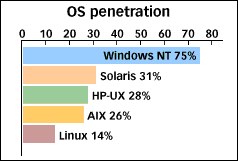Growing up Linux
Freeware OS gains groundswell of industry support, including that of Sun Microsystems
|
|
Growing up LinuxFreeware OS gains groundswell of industry support, including that of Sun Microsystems
|
|
Mail this article to a friend |
As the ship date for Microsoft's Windows NT 5.0 drifts into the next millennium and the list of bugs and security scares grows longer and longer, Linux is beginning to emerge as a popular alternative to NT.
Sun Microsystems seems to think so. This spring it actually kicked in some money in support of Linux, becoming a member of Linux International -- making Linux the only operating system other than Solaris Sun is in any way supporting on UltraSPARC.
|
|
Linux inside
Intel, too, is setting its sights on Linux. In the last six
months, the company has begun cultivating relationships in the
Linux development community, according to Intel's Enterprise
Server Group Marketing Director Rick Echevarria. "It took us a
while to wake up to the Linux phenomenon," he observes, "but when
we started doing the research...we started to hear about some
large companies deploying Linux."
It will take some work for Intel, with its penchant for secrecy and non-disclosure agreements, to find a productive way of getting early information on technologies like Merced (Intel's next-generation 64-bit chip), and I20 (Intel's next-generation I/O technology) to the Linux community, but it's work that Echevarria clearly wants to do. "It's something that we're developing," he says. "I'm sure over the next few months we'll come up with some creative solutions."
Brand recognition
Long thought of as a mere hobbyist OS, Linux has made great
strides into the ISP, university, and government markets of late.
"It's one of the fastest development projects I've ever seen,"
observes Mary Hubley, a research director at analyst firm
DataPro. Since it first appeared as a tiny blip on Hubley's
annual survey of IT professionals three years ago, Linux has
become a force to be reckoned with. In this year's survey, Linux
ranked number one in terms of overall customer satisfaction, and
it's being used by 14 percent of the 829 IT managers who filled out
the survey.

Source: DataPro survey of 829 IT professionals, 1998 |
Fourteen percent puts Linux just below AIX in terms of corporate penetration -- not bad, but not exactly an earthquake, either. There is room for improvement. The OS could be easier to install and maintain and it probably wouldn't be rated tops in customer satisfaction if it weren't free, says Hubley, but the DataPro numbers do make one thing clear: Linux can no longer be completely ignored in the corporate world.
Torvalds guesses that when you consider the entire market of operating systems -- not just the corporate world -- Linux is probably the second most popular OS there is. "Two years ago, people did run Linux," he says, "but they certainly did not mention it to anybody. These days people are running Linux, and they're fairly happy mentioning it. It's not something you have to hide from your MIS department."
In other words, without a marketing department -- in fact with a general aversion to all things marketing -- Linux is starting to gain brand recognition.
ISV stampede
And why shouldn't it? It has decent server applications, it's
free, it runs on cheap, even obsolete hardware, and you can look
at the source code for nothing.
In the past few months, the list of companies that have jumped on the Linux bandwagon reads like a who's who of enterprise vendors. They include:
Sun too?
Perhaps the most interesting of these Linux converts is Sun,
which isn't exactly known for the support it gives to competing
operating systems. On top of joining Linux International, Sun has
also become generally more involved in the Linux world, says Lisa
Sullivan, marketing director for Red Hat Software's Products
Division.
"Sun has sent machines," says Sullivan. "They have had some Sun people talking to Linux developers here and the community at large about kernel-specific issues. So they've been really helpful."
Clearly Sun views Linux as a greater threat to Windows NT than to its own Solaris operating system. "I think what you're seeing is a move within the NT community to look beyond NT for other operating systems that might be a little more easy to manage than NT," says Charles Andres, the group manager for I/O technologies at Sun. His group has spearheaded the Linux relationship, not because Sun has any visions of bundling Linux, he says, but because of demand from in-house developers who were looking to run Linux as well as Solaris on their SPARC hardware.
But isn't Linux a threat to Solaris as much as it is to NT? "We don't see Solaris and Linux as competing products," says Andres, "because one is supported and one isn't." When asked about Red Hat's support of Linux, Andres explains "it isn't [supported] to the same extent that Solaris is."
Andres's slip reflects Linux's greatest obstacle: public perception. IT managers, says Torvalds, just want to use something they've heard of. He says that managers who nix Linux implementations because of issues like customer support are really just looking for excuses. After all, he asks, is Microsoft customer support really any better? "The primary issue is just to make people comfortable with Linux," says Torvalds
And that may be just what is starting to happen.
![]()
|
|
Resources
If you have technical problems with this magazine, contact webmaster@sunworld.com
URL: http://www.sunworld.com/swol-08-1998/swol-08-linux.html
Last modified: